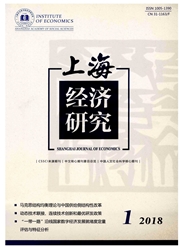

 中文摘要:
中文摘要:
本文从中国要素市场仍存留的政府干预这一现象出发,发现国有经济面对较低的资本价格和较高的劳动力价格,非国有经济面对较高的资本价格和较低的劳动力价格,两类企业的要素密集度存在异质性差异。在新古典分配的框架下,要素密集度差异扩大会导致要素替代弹性变大,资本对劳动的替代更为容易,这降低了中国的劳动收入份额。利用省级面板数据的实证研究结果表明,上述结论能够得到一定的证实。因此,中国未来应从户籍制度、利率制度等方面着手进行要素市场化改革,从而提高居民收入,减轻经济增长对投资和出口的依赖。
 英文摘要:
英文摘要:
There're still intervention from Chinese government in the factor market's tarting from this phenomenon, this paper found that the state economy face lower prices and higher capital labor costs, and the non-state-owned economy face higher prices and lower capital labor costs. Also, there are heterogeneity differences in the factor intensity categories of these enterprises. In the framework of neoclassical distribution, factor intensity differences will lead to expansion of larger factor substitution elasticity, and the substitution of capital for labor would be easier, which reduces the labor income share in China. Study from the 1993 -2008 provincial panel data, these conclusions can be certain confirmed. Therefore, Chinese government should do market-oriented institutional reforms in the household registration system and interest rates, etc. which would improve incomes and reduce the economic growth depends on investment and exports.
 同期刊论文项目
同期刊论文项目
 同项目期刊论文
同项目期刊论文
 期刊信息
期刊信息
